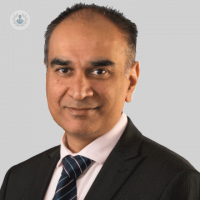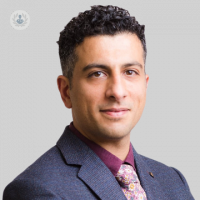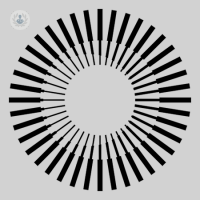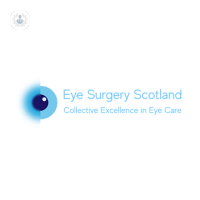What is refractive lens exchange?
Refractive lens exchange (RLE), also known as lens replacement surgery or clear lens extraction is a procedure offered to patients with extreme farsightedness (hyperopia) or age-related presbyopia (loss of the ability to focus on nearby objects). The procedure is actually almost identical to the procedure for cataract surgery in that the natural lens is replaced with an intraocular lens (IOL) which is a synthetic implant. Whilst cataract surgery is done to remove a cloudy lens, RLE is done to reduce the need for wearing glasses or using contact lenses. Hence, RLE can be an alternative option to other forms of corrective eye surgery such as LASIK.

Why is it done?
The aim of RLE is to reduce dependence on glasses or contact lenses. This can help patients to be better abled at leading a more active lifestyle, improving their quality of life. Additionally, having RLE means that later in life you will not develop cataracts and need cataracts surgery. This is because your lenses will already be IOLs. RLE is often offered to patients who are over the age of 50 with a glasses prescription too high for laser eye surgery. People with extreme astigmatism can also benefit from RLE as the implanted IOL can have astigmatism correction.
What does refractive lens exchange involve?
During the procedure you will lie down, whilst your surgeon performs the surgery through a microscope. You can have surgery on both eyes in one day, but this will depend on your surgeon and their recommendation. Surgery takes roughly 20 minutes per eye and is done as a day-case procedure, meaning you return home on the same day. Anaesthetic drops are administered to the eye so that there is no discomfort. Next, a small incision is made in the eye where the white of the eye meets the cornea. Next, the membrane covering the natural lens is removed and the natural lens is removed. Following this, the IOL is inserted and the cavity is washed with fluid and antibiotics.
You can have different types of IOL inserted, depending on your vision needs:
- Monofocal IOLs – to improve distance vision.
- Multifocal IOLs – to improve intermediate and near vision.
How do you prepare for refractive lens exchange?
There are no specific measures needed to prepare for RLE, however, your surgeon will advise you if any need to be made.
Aftercare:
Many patients will report immediate improvements in vision following RLE, however, return to normal activities should commence 5-7 days after the procedure. The full effects of the surgery will be experienced a few weeks after the procedure.
Alternatives to refractive lens exchange:
Alternatives to RLE include laser eye surgery and phakic intraocular lens implantation (PIOL). Laser eye surgery does not involve lens implantation, but instead uses a special laser to correct the focusing ability and curvature of the eye. Phakic intraocular lens implantation does use lens implants, but instead of replacing the natural lens, they are inserted to sit in front of the natural lens. However, RLE is often a better option for older patients, whilst laser surgery and PIOL are better for younger patients. Of course, another option is to continue using glasses or contact lenses.
05-30-2018 05-15-2023Refractive lens exchange
What is refractive lens exchange?
Refractive lens exchange (RLE), also known as lens replacement surgery or clear lens extraction is a procedure offered to patients with extreme farsightedness (hyperopia) or age-related presbyopia (loss of the ability to focus on nearby objects). The procedure is actually almost identical to the procedure for cataract surgery in that the natural lens is replaced with an intraocular lens (IOL) which is a synthetic implant. Whilst cataract surgery is done to remove a cloudy lens, RLE is done to reduce the need for wearing glasses or using contact lenses. Hence, RLE can be an alternative option to other forms of corrective eye surgery such as LASIK.

Why is it done?
The aim of RLE is to reduce dependence on glasses or contact lenses. This can help patients to be better abled at leading a more active lifestyle, improving their quality of life. Additionally, having RLE means that later in life you will not develop cataracts and need cataracts surgery. This is because your lenses will already be IOLs. RLE is often offered to patients who are over the age of 50 with a glasses prescription too high for laser eye surgery. People with extreme astigmatism can also benefit from RLE as the implanted IOL can have astigmatism correction.
What does refractive lens exchange involve?
During the procedure you will lie down, whilst your surgeon performs the surgery through a microscope. You can have surgery on both eyes in one day, but this will depend on your surgeon and their recommendation. Surgery takes roughly 20 minutes per eye and is done as a day-case procedure, meaning you return home on the same day. Anaesthetic drops are administered to the eye so that there is no discomfort. Next, a small incision is made in the eye where the white of the eye meets the cornea. Next, the membrane covering the natural lens is removed and the natural lens is removed. Following this, the IOL is inserted and the cavity is washed with fluid and antibiotics.
You can have different types of IOL inserted, depending on your vision needs:
- Monofocal IOLs – to improve distance vision.
- Multifocal IOLs – to improve intermediate and near vision.
How do you prepare for refractive lens exchange?
There are no specific measures needed to prepare for RLE, however, your surgeon will advise you if any need to be made.
Aftercare:
Many patients will report immediate improvements in vision following RLE, however, return to normal activities should commence 5-7 days after the procedure. The full effects of the surgery will be experienced a few weeks after the procedure.
Alternatives to refractive lens exchange:
Alternatives to RLE include laser eye surgery and phakic intraocular lens implantation (PIOL). Laser eye surgery does not involve lens implantation, but instead uses a special laser to correct the focusing ability and curvature of the eye. Phakic intraocular lens implantation does use lens implants, but instead of replacing the natural lens, they are inserted to sit in front of the natural lens. However, RLE is often a better option for older patients, whilst laser surgery and PIOL are better for younger patients. Of course, another option is to continue using glasses or contact lenses.
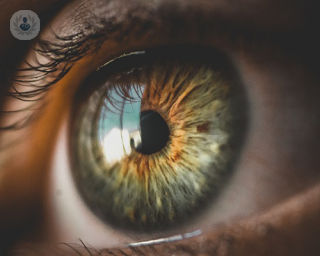

Aftercare advice: What to expect following cataract or lens replacement surgery
By Mr Jagmohan Chawla
2025-01-20
Highly experienced consultant ophthalmic and oculoplastic surgeon Mr Jagmohan Chawla shares his expert advice on aftercare following cataract or refractive lens exchange surgery in this informative article for patients. See more


Oculentis lens exchange: An expert guide on restoring clear vision
By Mr Stephen Lash
2025-01-20
Mr Stephen Lash, a highly respected consultant ophthalmic surgeon details how opacification issues faced by patients with Oculentis multi-focal lenses can be resolved with expert care. See more


Lens replacement surgery or laser vision correction: Which is right for me?
By Mr Jagmohan Chawla
2025-01-20
Leading consultant ophthalmic and oculoplastic surgeon Mr Jagmohan Chawla explains how refractive lens exchange may offer advantages over laser vision correction for some patients looking to improve their spectacle dependence in this informative article for patients. See more
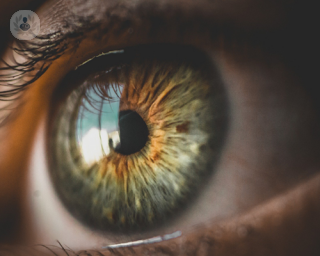

Refractive lens exchange and presbyopia
By Mr Satish Kotta
2025-01-19
Presbyopia is a common age-related vision condition that typically begins to affect individuals in their 40s. It happens when the natural lens of the eye loses flexibility, and it becomes difficult focussing on close objects. For those seeking a long-term solution to presbyopia, refractive lens exchange (RLE) has emerged as an effective treatment option. See more
Experts in Refractive lens exchange
-
Mr Amit Patel
OphthalmologyExpert in:
- Cataracts
- Refractive lens exchange
- Laser eye surgery
- Corneal transplant
- Keratoconus
- Dry eye
-
Mr Imran Zaheer
OphthalmologyExpert in:
- Oculoplastics
- Glaucoma surgery
- Cataracts
- Laser eye surgery
- Refractive lens exchange
- Eyelid malpositions
-
Ms Tahmina Pearsall
OphthalmologyExpert in:
- PreserFlo™
- Cataracts
- Refractive lens exchange
- Laser eye surgery
- Glaucoma
- Pterygium and pinguecula
-
Mr Danny Mitry
OphthalmologyExpert in:
- Retinal detachment surgery
- Cataracts
- Refractive lens exchange
- Diabetic retinopathy
- Macular degeneration (AMD)
- Macular hole
-
Mr Sumith Perera
OphthalmologyExpert in:
- Cataracts
- Refractive lens exchange
- ICL implants
- Laser eye surgery
- LASIK
- Refractive surgery
- See all

Mount Alvernia Hospital - part of Circle Health Group
Mount Alvernia Hospital - part of Circle Health Group
Harvey Road, Guildford GU1 3LX
No existe teléfono en el centro.
By using the telephone number provided by TOP DOCTORS, you automatically agree to let us use your phone number for statistical and commercial purposes. For further information, read our Privacy Policy
Top Doctors

Laser Vision
Laser Vision
Prema Compass Road North Harbour Business Park Portsmouth PO6 4RP
No existe teléfono en el centro.
By using the telephone number provided by TOP DOCTORS, you automatically agree to let us use your phone number for statistical and commercial purposes. For further information, read our Privacy Policy
Top Doctors

Eye Surgery Scotland
Eye Surgery Scotland
40 Colinton Road, EH10 5BT
No existe teléfono en el centro.
By using the telephone number provided by TOP DOCTORS, you automatically agree to let us use your phone number for statistical and commercial purposes. For further information, read our Privacy Policy
Top Doctors
-
Mount Alvernia Hospital - part of Circle Health Group
Harvey Road, Guildford GU1 3LX, GuildfordExpert in:
- Hip
- Cancer
- Cardiology
- General Surgery
- Orthopaedic surgery
- Orthopaedic spinal surgery
-
Laser Vision
Prema Compass Road North Harbour Business Park Portsmouth PO6 4RP, HavantExpert in:
- Cataracts
- Laser eye surgery
- ICL lens implants
- Ophthalmology
- Keratoconus
- Lens replacement
-
Eye Surgery Scotland
40 Colinton Road, EH10 5BT, EdinburghExpert in:
- Cataracts
- Retina and Vitreous
- Lens replacement
- See all
- Most viewed diseases, medical tests, and treatments
- Visual impairment
- Diabetic retinopathy
- Retina
- Presbyopia
- Nystagmus
- Myopia
- Hyperopia (farsightedness)
- Eye examination
- Blepharitis
- Astigmatism

